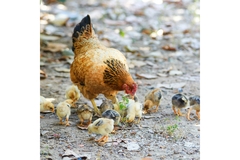
- Industry news
Industry news
- Category news
Category news
- Reports
- Key trends
- Multimedia
- Journal
- Events
- Suppliers
- Home
- Industry news
Industry news
- Category news
Category news
- Reports
- Key trends
- Multimedia
- Events
- Suppliers
Ethical eggs: NestFresh transitions to in-ovo sexing to reduce male chick culling

21 Aug 2024 --- Sustainable egg producer NestFresh is adopting the “in-ovo sexing technology” that identifies the gender of chicks before hatching to reduce male chick culling and advance animal welfare. The move marks a “pivotal moment” in the US egg industry since the company says it is the first to implement the emerging technology for their chicks beginning in late 2024.
“While many companies have announced plans to adopt in-ovo sexing technologies when available, NestFresh will be the first to actually implement this technology and bring in-ovo sexed eggs to the US market,” says Mike Sencer, executive VP at NestFresh.
“We have invested significant time and resources into research, development, and understanding the complexities of this emerging technology. Having collaborated with various systems and hatcheries, we have now placed orders for in-ovo chicks, with our eggs expected to hit the market by mid-2025.”

The California-based company aims to be the first to use this “non-invasive” in-ovo sexing technology and transition its entire egg line to this new process. These first-of-their-kind certified eggs will launch in retailers in July 2025.
Modernizing sex determination
Traditional approaches for detecting the in-ovo sex of chicken embryos involve opening the eggshell and inner membrane. Scientists have flagged these approaches as destructive, time-consuming, and inefficient. They also raise ethical and economic concerns.
 The in-ovo sexing method eliminates the need for male chick euthanization and aligns more closely with consumers’ expectations for responsible animal stewardship.Animal health and welfare think tank Innovate Animal AG says that the in-ovo sexing technology allows egg producers to hatch only females.
The in-ovo sexing method eliminates the need for male chick euthanization and aligns more closely with consumers’ expectations for responsible animal stewardship.Animal health and welfare think tank Innovate Animal AG says that the in-ovo sexing technology allows egg producers to hatch only females.
“This innovative approach eliminates the need for male chick culling, aligning the industry more closely with modern consumers’ expectations for responsible animal stewardship,” explains Robert Yaman, CEO of Innovate Animal Ag.
The technology is currently available only in Europe and another US-based egg supplier, Egg Innovations, recently announced plans to adopt it to advance humane egg production.
A paradigm shift
NestFresh’s adoption of in-ovo sexing technology follows its ongoing focus on ethical practices. It has third-party certified claims for its products, including Certified Humane.
The company claims to have never owned a cage and is the “first national brand to offer cage-free, non-GMO, and organic eggs, as well as the first to offer Regenerative Organic Certified milk and eggs under their New Barn Organics line.”
Mimi Stein, executive director of Humane Farm Animal Care (HFAC), which oversees the Certified Humane program, says: “We see this movement as part of a major paradigm shift to correct a longstanding industry challenge in egg production.”
The routine killing of male chicks in the conventional egg industry is a practice largely unknown to the public but one that is deeply concerning to anyone who learns of it, adds Nancy Roulston, senior director of Corporate Policy and Animal Science, ASPCA Farm Animal Welfare.
 The world egg production has increased by 150% in the last 30 years and the industry is now focusing on measuring poultry welfare, such as cage-free egg production.She believes NestFresh’s adoption of the technology will “remove the untenable practice of male chick culling from their supply chains, offering a more humane option for their buyers and shoppers alike.”
The world egg production has increased by 150% in the last 30 years and the industry is now focusing on measuring poultry welfare, such as cage-free egg production.She believes NestFresh’s adoption of the technology will “remove the untenable practice of male chick culling from their supply chains, offering a more humane option for their buyers and shoppers alike.”
Changing the industrial status quo
In the last three decades, world egg production has increased by 150%, according to the FAO. This has instigated the egg industry to turn its focus toward developing valid methods of measuring poultry welfare, including cage-free egg production and scientific research, to understand the coping capacity and preferences of chickens for the welfare of laying hens on commercial farms.
Animal welfare supporters are also taking a stand. In June, the Citizens Committee of the End the Cage Age European Citizens’ Initiative (ECI), held the European Commission accountable for failing to deliver the legislative proposals it promised in response to the ECI, in which 1.4 million EU citizens demanded an end to cage farming.
However, Hillary Hendrickson, senior corporate relations manager at Mercy for Animals, flags that “macerating male chicks soon after they hatch is still standard in the egg industry, as they do not lay eggs and are therefore deemed useless.”
According to her, NestFresh’s adoption of in-ovo sexing will “change the status quo in the egg industry.”
By Insha Naureen









